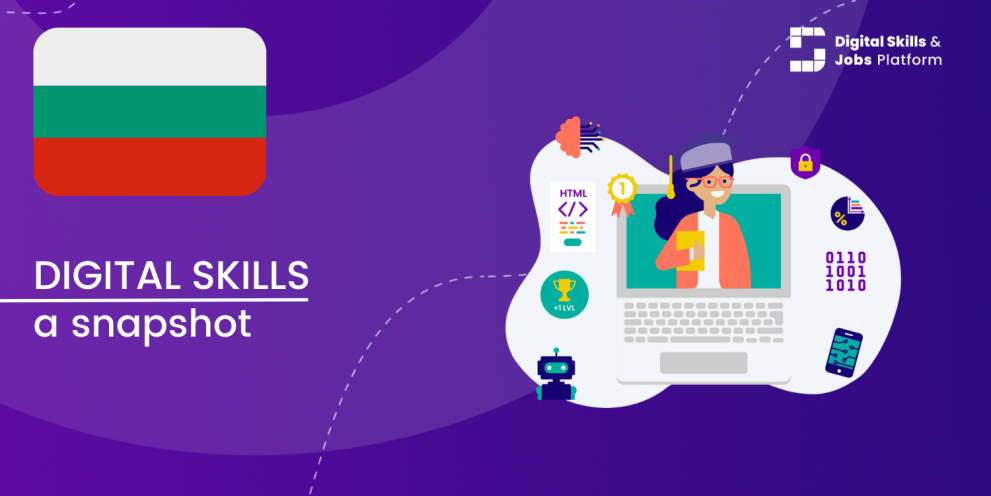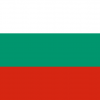Bulgaria: a snapshot of digital skills

Introduction
In the 2024 edition of the Digital Decade report, Bulgaria has achieved 35.5% basic digital skills coverage, compared to the EU average of 55.6%. This puts Bulgaria at 44.4% of the overall target for the EU 2030 goal, which aims to have 80% of the EU population possessing at least basic digital skills. The country has seen an annual growth of 6.7% from the previous year.
According to the Digital Decade report 2024, Bulgaria performs worse than the EU average in both digital skills indicators. The percentage of ICT specialists in employment is lower than the EU average, yet increasing from 3.8% to 4.3% (EU average - 4.8%) in 2023.
According to data presented by Bulgarian National Statistical Institute (2023), 96.3% of business have internet access, while 39.7% of employees use it. Only 9.1% of business are providing ICT training to their employees. 79.8% of people aged between 16 and 74 are regularly using internet.
Digital National Coalition (Дигитална национална коалиция DNK) is a non-profit association for public benefit, founded in 2013. Based in Sofia, Bulgaria the organisation operates on a national level and is part of the European Commission’s Digital Skills and Jobs Coalition (DSJC) initiative. The main goal of the coalition is to stimulate the intersectoral debate on the challenges and opportunities facing Bulgaria's digital transition, uniting the private sector, academic institutions and public administration. DNK connects government, business, education, training, and labour market stakeholders. It supports the activities of over thirty Alliance members in order to address the lack of skills in information and communication technology (ICT) and satisfy the demand for ICT professionals and specialists in Bulgaria.
Overview of state strategies and national initiatives
State strategies
Digital transformation of Bulgaria for the period 2020-2030, adopted in 2020, defines the vision and policy objectives for the digital transformation of Bulgaria for the next decade as a generalized policy framework, which includes the National Program “Digital Bulgaria 2025”, the priorities of the “National Development Program BULGARIA 2030”, as well as a number of other national strategic documents with a technological component, covering the period up to 2030. The document outlines six goals to be attained during this 10-year period: Deploy a secure digital infrastructure; Provide ample access to technical knowledge and digital skills; Increasing research and innovation capabilities; Unlock the value of data; Digitalization for a low-carbon circular economy; Improving government efficacy and the calibre of public services.
Strategic framework for the development of education, training, and learning in the republic of Bulgaria (2021-2030) considers the main challenges in public affairs in the 21st century driven by the intensive pace of development in all areas of public life, generated by mass digitization and technological advancement. The strategy acknowledges the unsatisfactory level of digital skills among participants in the educational process but highlights as strengths the introduced training for acquiring digital skills and the provided access to free internet and digital resources in schools, as well as the priority policies for digitalization in education, including in relation to the transition to a digital and green economy. Educational Innovations, Digital Transformation, and Sustainable Development in Education are three of the nine priority areas for the development of education and training through 2030. Digital skills and competencies are a priority across the entire educational continuum, and access to ICT for children of the twenty-first century is deemed an integral component of education.
Concept for the development of artificial intelligence in Bulgaria until 2030 offers a comprehensive vision for the development and use of artificial intelligence in Bulgaria. It is based on the strategy and program documents of the European Commission, which consider artificial intelligence as one of the main drivers of digital transformation in Europe. Creating scientific, expert, business, and management capacity is the primary objective of this concept, as it relates to the development and implementation of artificial intelligence systems. It is intended to provide modern communication and scientific infrastructure for the advancement of digital technologies of the next generation. The system of education and lifelong learning will be enhanced. Support will be provided for the advancement of scientific research and the implementation of innovations in key sectors, and efforts will be made to establish an ethical legal and regulatory framework that enjoys public confidence.
National initiatives
The total budget of the Bulgarian Recovery and Resilience Plan is nearly €6.9 billion, with the allocated budget for the digital transition of €1.6 billion (25.8% 4 of the plan’s total budget). The plan is overall composed of twelve components, in four policy pillars: 1) Innovative Bulgaria, 2) Green Bulgaria, 3) Connected Bulgaria, and 4) Fair Bulgaria. Digital transition is supported with reforms and investments aimed at increasing the coverage of very high capacity networks across the country, including in rural and sparsely populated areas (€270 million); enhancing the digital skills (€319 million); improving the digitalisation of public administration and the provision of digital public services in key areas such as justice, postal services, health, employment and social protection (€297 million); supporting the digitalisation of businesses (€15.7 million), as well as of the transport (€202.6 million) and energy sectors (€75.7 million).
Provision of digital skills trainings and set-up of a platform for adult learning will be financed with close to €165 million from the Recovery and Resilience Facility aiming to improve the up- and re-skilling of the workforce, with a focus on digital skills. This will be accomplished by creating a completely functional digital platform that provides access to online courses and learning resources in order to increase adult participation in distance learning. Additionally, a network of 760 digital communities will be established across the nation to provide free access to the training platform. Approximately 500,000 unemployed and employed individuals will receive basic and/or intermediate level digital skills training and 100,000 unemployed and employed individuals will validate their basic and/or intermediate level digital skills knowledge with the aid of this investment.
Objective of the Development of the social economy investment is to promote the social economy by providing assistance to the development of social and solidarity economy enterprises and organisations. The investment involves the construction of focus centres for the social and solidarity economy, which will assist businesses and organisations involved in the social and solidarity economy. This will be accomplished through the provision of advisory services and technical assistance, including aiding in the digitalisation of these businesses' business processes. The investment also includes the establishment of a digital platform to promote the products and services of businesses and organisations engaged in the social and solidarity economy.
Funding opportunities
Funding opportunities for upskilling and reskilling to support the digital competences of individuals and organizations are available in form of loans, grants and financial instruments. For the period 2021 – 2026 most of the activities in digital transformation are financed through Recovery and Resilience facility but also as activities in Horizon, Erasmus+, ESIF and EEA grant schemes. You may find more on the page of Bulgaria's Digital National Coalition and in the article on the Digital Skills and Jobs Platform.



